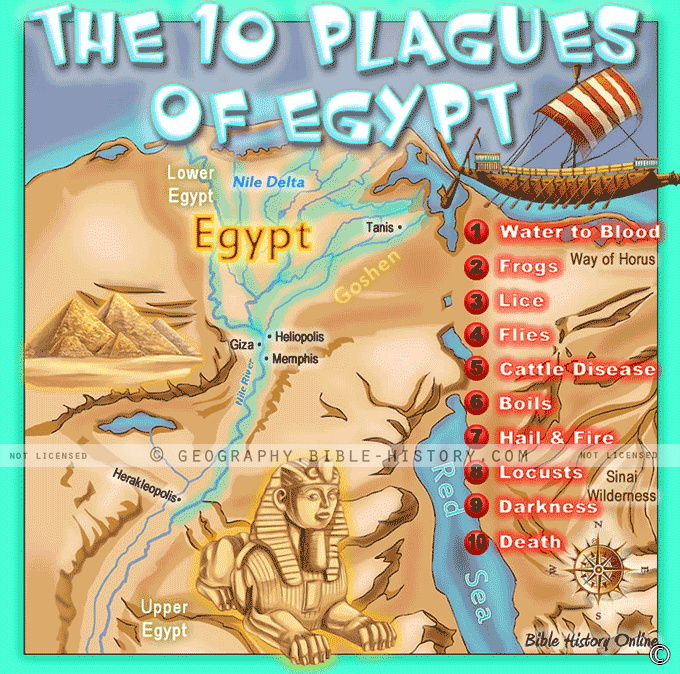
The narrative of the 10 Plagues of Egypt is an indelible chapter in the annals of ancient history and religious lore. It chronicles the divine interactions between Moses, the prophet, and Pharaoh, the ruler of Egypt. This series of catastrophic events, as described in the book of Exodus, represents a pivotal moment in the Israelites' journey from enslavement to freedom. As we delve into the story of the 10 Plagues, we explore themes of divine judgement, liberation, and the enduring power of faith.
A Struggle for Liberation
The 10 Plagues mark a period of intense struggle between Moses, on behalf of the Israelites, and Pharaoh, who repeatedly refused to let the Hebrew people go. Each plague was a divine manifestation of power aimed at persuading Pharaoh to release the Israelites from their bondage. These cataclysmic events demonstrated that no human power could withstand the will of the divine.
Divine Judgement and Symbols of Power
The plagues encompassed a range of natural and supernatural phenomena, from water turning to blood to swarms of locusts and darkness covering the land. Each plague was a symbolic representation of Egypt's deities and natural elements, challenging the power structures and beliefs that upheld Pharaoh's dominion. The plagues were not merely a series of punishments but a profound assertion of divine sovereignty.
The Path to Liberation
As the plagues intensified, so did Pharaoh's resistance. It was only after the 10th plague – the death of the firstborn – that Pharaoh finally relented. The Passover, a commemoration of this event, became a symbol of liberation and the covenant between God and the Israelites. The plagues were instrumental in breaking the chains of oppression and forging a path toward freedom.
Spiritual and Historical Significance
The story of the 10 Plagues carries both spiritual and historical significance. It illustrates the complexity of the human response to divine intervention, with Pharaoh's heart hardening even in the face of overwhelming evidence. The plagues also demonstrate the transformative power of faith, as the Israelites' trust in the divine plan guided them through moments of adversity toward the promise of a better future.
Lessons of Humility and Liberation
Beyond their historical context, the 10 Plagues offer timeless lessons. They remind us of the consequences of unchecked arrogance and the importance of humility before forces greater than ourselves. The narrative also underscores the idea that liberation often comes at a cost, and that the journey to freedom requires resilience, faith, and unwavering commitment to a higher purpose.
The story of the 10 Plagues of Egypt is a testament to the interplay between divine intervention and human agency. It's a narrative of judgement and redemption, oppression and liberation, obedience and defiance. As we explore the layers of this story, we gain insights into the complexities of faith, the dynamics of power, and the enduring resonance of a tale that continues to captivate hearts and minds across cultures and generations.
Blank Topo Map of The World
Abraham’s Journey
The Captivity of Judah (586-516 B.C.)
The Fall of Judah 586 B.C.
The Northern Kingdom of Israel
The Southern Kingdom of Judah
The Divided Kingdom
The Fertile Crescent
Ur of the Chaldees
Shechem in Old Testament Times
Prophets, Kings, and Nations
Jesus Last Passover
New Testament Israel
New Testament Places
Old Testament Israel
Provinces of the Roman Empire
Israel during David’s Kingdom
David’s Kingdom
Cities of the New Testament 4
Cities of the New Testament 3
Cities of the New Testament 2
Mediterranean Sea
Cities of the New Testament
First Century Jerusalem
Empire of David and Solomon
David’s Kingdom
Israel Under Rehoboam
Ophir and Tarshish
The Period of the Kings
Ramoth Gilead
Samaria
Solomon’s Temple
Zarephath and MT Carmel
Jabesh Gilead and Tribes
Judah in the Time of David
Kingdom of Saul
Kirjath Jearim
Michmash
Mount Gilboa in the Time of David
Nob Davids Flight
Shiloh
Israel and Judah
Assyrian Empire Under Esarhaddon
Assyrian Empire Under Sennacherib
Captivity of 10 Tribes
Events in 2 Kings
The Khabur River
Israel and Syria
Captives From Judah
Kingdom of Jeroboam
Mesha’s Kingdom
Pharaoh Necho Battles King Josiah at Megiddo
Babylonian, Mede and Persian Empires
Samaria and Nearby Territories
Syria at its Height
Hebron
Mahanaim
1949 Map of Israel With Boundaries
First & Second Journeys of Paul
Journeys of the Apostles
Paul’s Third Missionary Journey
Saul’s Journey to Damascus and Arabia
Paul’s Final Visits
Paul’s 1st Missionary Journey
Paul’s 2nd Missionary Journey
Paul’s 3rd Missionary Journey
Paul’s Voyage to Rome
Phillip Journeys to Samaria and Gaza
Judah at the Time of Amos
Empire of Alexander the Great
Israel Under the Maccabees
Galilee During Maccabees
Idumea Intertestamental Period
Kingdom of the Ptolemies
Kingdom of the Seleucids
Ptolemaic Egypt Seleucid Asia
The Roman World
Kingdom of Ptolemies and Seleucids
The World During the 6TH Century BC
Mount Horeb
The Red Sea
The Exodus
Ezra’s Journey to Restore Jerusalem
Israel and Judah During Hosea’s Time
The Ancient World
Canaan During the Time of Abraham
The City of Shechem
Supposed Location of the Garden of Eden
The Land of Israel in Genesis
The Jordan River
The Kingdom of Nimrod
Mount Ararat and Mesopotamia
The Descendants
Sodom and Gomorrah
The Kingdom of Egypt
The Hamites
The Kingdom of the Hittites
Ur of the Chaldees
Judah at the Time of Haggai
Jesus Passes Through Samaria
